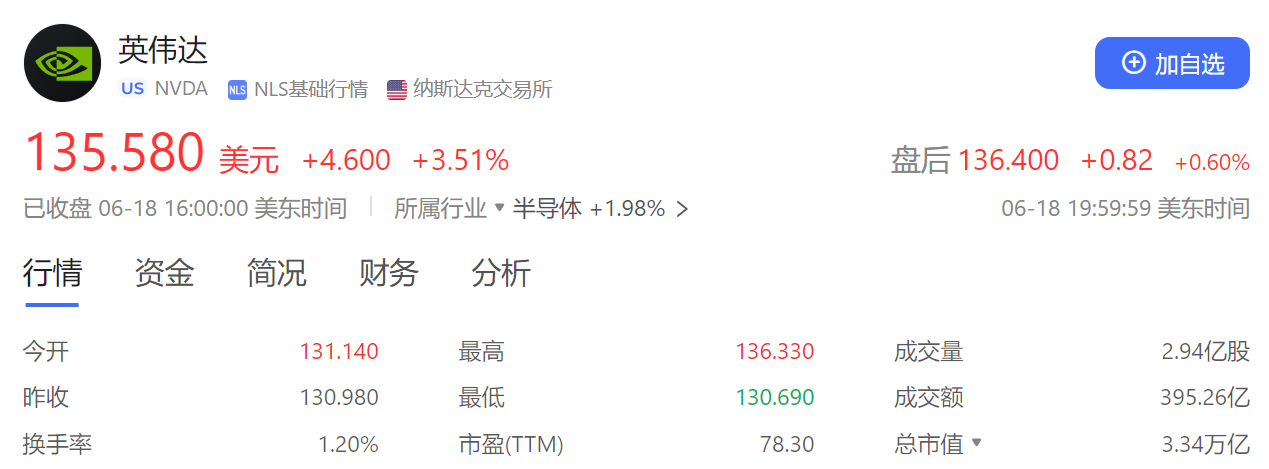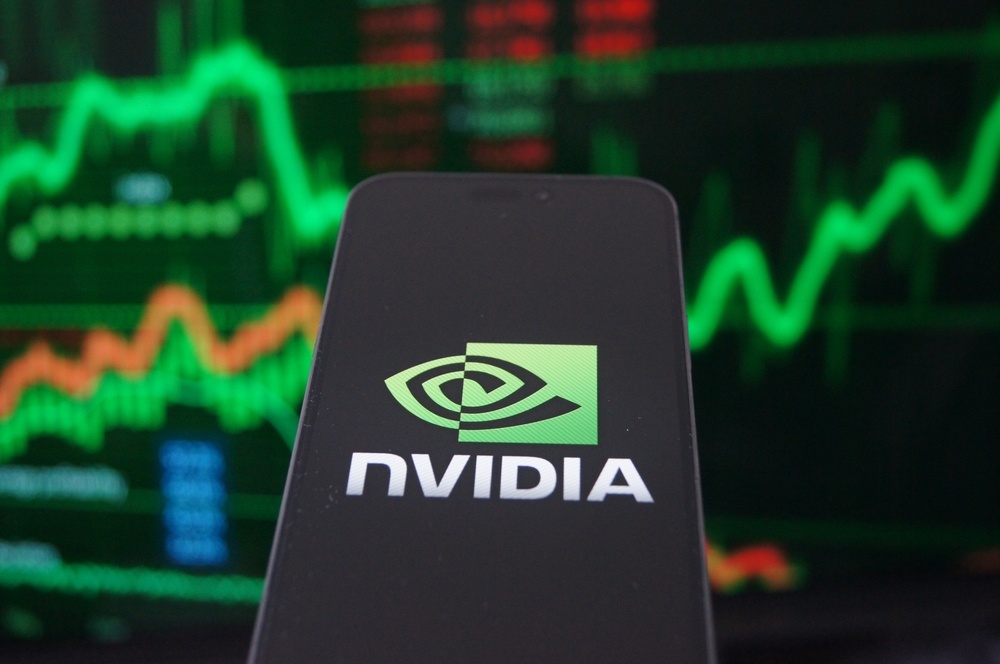Leave Apple and Microsoft behind! Nvidia won the title of "world's highest market value"
On Tuesday (June 18th), Nvidia closed up 3.51% to $135.58, with a total market value of $3.34 trillion, surpassing Apple and Microsoft and winning the title of "world's largest market value".
Nvidia has made history again.
The highest global market value
On Tuesday (June 18th), Nvidia's stock price continued to rise, closing up 3.51% to $135.58, with a total market value of $3.34 trillion, surpassing Apple ($3.29 trillion) and Microsoft ($3.32 trillion), and winning the title of "world's largest market value".

Since the beginning of this year, Nvidia's stock price has risen by about 175%. Over the past 12 months, Nvidia's stock price has risen by over 215%, and over the past five years, it has risen by over 3,400%.
Especially since last year, Nvidia's stock price has been like sitting on a rocket.
On June 13th last year, Nvidia's market value had just surpassed $1 trillion, and on February 23rd this year, its market value had exceeded $2 trillion. More than three months later, Nvidia broke through the $3 trillion mark on June 5th.
Nvidia grew its market value from $2 trillion to $3 trillion in just 96 days, the fastest rate on record. By contrast, according to Bespoke Investment Group data, it took Microsoft 945 days to increase its market value from $2 trillion to $3 trillion, while Apple took 1,044 days.
In addition, Nvidia's soaring stock price has made it the largest heavyweight stock in the S&P 500 index and played a key role in the S&P 500 index's repeated historical highs this year.
As of May, the S&P 500 index is almost completely correlated with Nvidia's stock price trend, which means Nvidia's stock price is rising, and the S&P 500 index is also rising together. According to data from Citigroup's stock research team, as of Monday this week, the rise in Nvidia's stock price contributed one-third of the S&P 500 index's rise so far this year.
The power of AI
Nvidia's surge is due to investors' enthusiasm for artificial intelligence. As a global leader in chip manufacturing, Nvidia's top-notch chips can help artificial intelligence companies efficiently train artificial intelligence models.
With obvious advantages, Nvidia has now become the preferred supplier of AI chips and integrated software in the technology industry. Technology giants such as Amazon, Google, Meta, Microsoft, and Tesla have all collaborated with Nvidia and hope to compete for more chips from Nvidia to improve their computing power and enhance the competitiveness of their AI models and services.
With the strong support of major technology companies, Nvidia's performance has also been steadily increasing.
On May 22nd, Nvidia released its financial report for the first quarter of the fiscal year 2025 as of April 28, 2024. According to performance data, Nvidia's revenue in the first quarter was $26.044 billion, a year-on-year increase of 262%. Net profit surged by over 628% year-on-year to $14.881 billion, adjusted earnings per share increased by 461% year-on-year to $6.12, and gross profit margin reached an astonishing 78.4% during the reporting period.
Among them, the performance of the data center business was particularly impressive - revenue increased by 427% year-on-year to $22.6 billion, once again reaching a historic high and accounting for 86% of the company's total revenue for the quarter.

On Tuesday, Hans Mosesmann, an analyst at Rosenblatt Securities, significantly raised Nvidia's stock target price from $140 to $200 and confirmed its "buy" rating. Mosesmann estimates that Nvidia is expected to achieve earnings per share of over $5 by 2026.
Mosesmann wrote in the report, "We see Nvidia's Hopper, Blackwell and Rubin series (data center processors) driving 'value' market share in one of Silicon Valley's most successful silicon/platform product cycles."
"The real narrative lies in the software that complements all the hardware goodness," Mosesmann said. "We anticipate this software aspect will significantly increase in the next decade in terms of overall sales mix, with an upward bias to valuation due to sustainability."
Who can challenge Nvidia?
Although Nvidia is currently in the limelight, it does not mean that it does not pose a threat.
Nvidia's competitors AMD and Intel are steadily advancing their AI chip plans, both aiming to surpass Nvidia.
AMD recently announced that its latest chips, MI325X and MI350, will be launched in 2024 and 2025 respectively, and stated that its next generation MI400 artificial intelligence accelerator platform will be launched in 2026.
Meanwhile, Intel has stated that the prices of its Gaudi 2 and Gaudi 3 artificial intelligence accelerators will be lower than those of its competitors. Due to the billions of dollars invested by major companies in AI chips, any competitive price is bound to be welcomed by them.
In addition, Nvidia also faces competition from its own customers, as technology giants such as Amazon, Google, and Microsoft are all developing their own chips in an attempt to break away from dependence on Nvidia chips and save on capital expenditures.
Although Nvidia faces many potential threats, its advantages are still quite obvious at present.
"They (referring to Nvidia) have a very stable position in the industry," said Rhys Williams, Chief Strategist at Wave Capital Management. "Obviously, they cannot always occupy 95% of the market share, but it is almost impossible for anyone to replace them."
·Original
Disclaimer: The views in this article are from the original Creator and do not represent the views or position of Hawk Insight. The content of the article is for reference, communication and learning only, and does not constitute investment advice. If it involves copyright issues, please contact us for deletion.